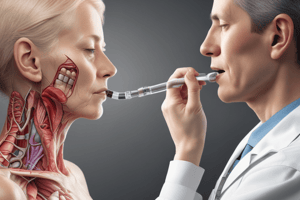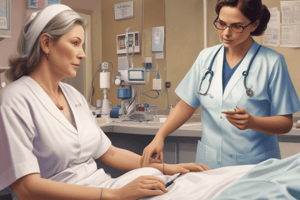Podcast
Questions and Answers
Which organ is responsible for the mechanical breakdown of food through chewing and the mixing of saliva?
Which organ is responsible for the mechanical breakdown of food through chewing and the mixing of saliva?
- Stomach
- Small intestine
- Mouth (correct)
- Esophagus
What is the function of the esophagus in the digestive system?
What is the function of the esophagus in the digestive system?
- Transport food to the stomach (correct)
- Mechanical breakdown of food
- Chemical breakdown of food
- Absorption of nutrients
Which organ in the GI tract uses acid and enzymes to further break down food?
Which organ in the GI tract uses acid and enzymes to further break down food?
- Esophagus
- Anus
- Large intestine
- Stomach (correct)
What is the role of the small intestine in digestion?
What is the role of the small intestine in digestion?
Which organ coordinates contractions and relaxations of its muscles to transport food to the stomach?
Which organ coordinates contractions and relaxations of its muscles to transport food to the stomach?
In which organ of the GI tract does the chemical breakdown of carbohydrates begin?
In which organ of the GI tract does the chemical breakdown of carbohydrates begin?
What is responsible for the absorption of nutrients from food?
What is responsible for the absorption of nutrients from food?
Which organ is responsible for producing bile to help break down fats?
Which organ is responsible for producing bile to help break down fats?
What is a common symptom of Gastroesophageal reflux disease (GERD)?
What is a common symptom of Gastroesophageal reflux disease (GERD)?
Which condition affects the large intestine and causes abdominal pain, bloating, and diarrhea?
Which condition affects the large intestine and causes abdominal pain, bloating, and diarrhea?
What is the primary function of the colon (large intestine)?
What is the primary function of the colon (large intestine)?
What role does the liver play in digestion?
What role does the liver play in digestion?
Study Notes
MedSurg and the Digestive System
The digestive system plays a crucial role in breaking down food into nutrients that the body can use. As a MedSurg nurse, understanding these processes is essential to provide effective patient care. This article will discuss the digestive system, focusing on the gastrointestinal tract and the liver's role in digestion.
The Gastrointestinal Tract
The gastrointestinal tract, commonly known as the GI tract, is a long, tubular structure that spans from the mouth to the anus. It is responsible for the mechanical and chemical breakdown of food, as well as the absorption of nutrients. The GI tract consists of several organs, including the mouth, esophagus, stomach, small intestine, large intestine, and anus.
Mouth
The mouth is the start of the GI tract. It is responsible for the mechanical breakdown of food through chewing and the mixing of saliva, which contains enzymes that begin the chemical breakdown of carbohydrates.
Esophagus
The esophagus is a muscular tube that connects the mouth to the stomach. It helps to transport food to the stomach by using peristalsis, which is the coordinated contractions and relaxations of its muscles.
Stomach
The stomach is a sac-like structure that uses acid and enzymes to break down food further. The stomach's acidic environment helps to kill bacteria and denature proteins, making them easier to digest.
Small Intestine
The small intestine is the longest part of the GI tract. It is responsible for the absorption of nutrients from food. The walls of the small intestine are lined with tiny finger-like projections called villi, which increase the surface area for absorption.
Large Intestine
The large intestine, also known as the colon, is responsible for the absorption of water and electrolytes from the food that has passed through the small intestine. The large intestine also stores and eliminates waste products through the rectum and anus.
The Liver and Digestion
The liver is not part of the GI tract but plays a vital role in digestion. It produces bile, which is stored in the gallbladder and released into the small intestine to help break down fats. The liver also metabolizes drugs and toxins, supports blood clotting, and regulates blood sugar levels.
Common Digestive Disorders
Understanding the digestive system is crucial for MedSurg nurses to identify and manage common digestive disorders. Some common digestive disorders include:
- Gastroesophageal reflux disease (GERD): A condition where stomach acid flows back into the esophagus, causing heartburn and discomfort.
- Irritable bowel syndrome (IBS): A chronic disorder that affects the large intestine, causing abdominal pain, bloating, and diarrhea.
- Inflammatory bowel disease (IBD): A group of chronic inflammatory conditions of the intestine, including Crohn's disease and ulcerative colitis.
In conclusion, MedSurg nurses play a crucial role in understanding and managing the digestive system. By understanding the structure and function of the GI tract and the liver's role in digestion, MedSurg nurses can provide effective patient care for various digestive disorders.
Studying That Suits You
Use AI to generate personalized quizzes and flashcards to suit your learning preferences.
Description
Test your knowledge on the digestive system and its importance in providing patient care as a MedSurg nurse. Explore topics such as the gastrointestinal tract, liver function in digestion, and common digestive disorders like GERD, IBS, and IBD.




